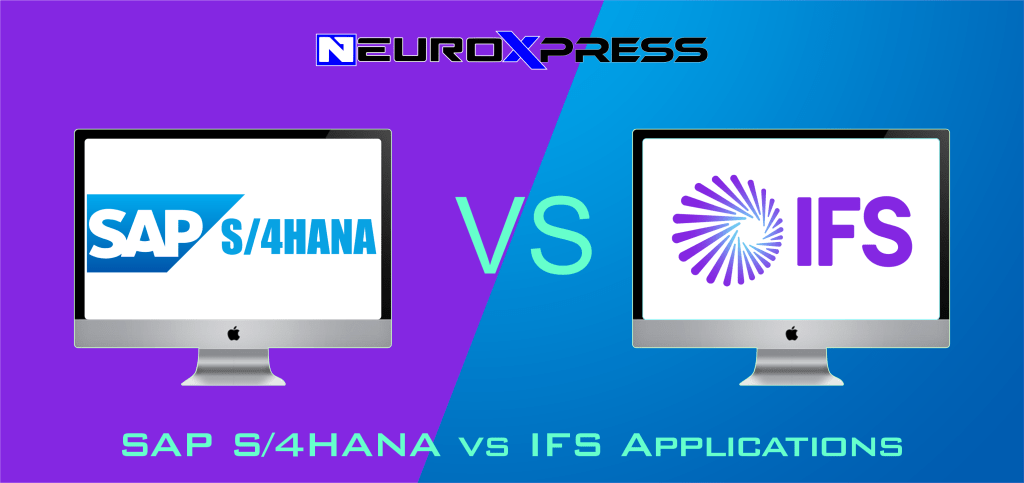SAP S/4HANA vs IFS Applications: Choosing the Right ERP for Your Enterprise

Introduction: SAP S/4HANA vs IFS Applications – The Modern ERP Dilemma
In today’s ever-evolving business landscape, choosing the right ERP system is not just a technical decision—it’s a strategic one. When comparing SAP S/4HANA vs IFS Applications, business leaders face a fundamental question: Do we go with the global enterprise powerhouse, or opt for a nimble, industry-focused challenger?
SAP S/4HANA, the digital core from SAP, has earned its reputation among Fortune 500 companies. Meanwhile, IFS Applications is rapidly gaining ground, especially in asset-intensive industries like aerospace, energy, and manufacturing. This guide explores both ERP giants, their strengths, weaknesses, and everything in between to help you make an informed decision.
The Story Begins: A Tale of Two Companies
Imagine two mid-sized companies preparing for rapid growth.
NovaTech, a global electronics manufacturer, faces supply chain complexity across continents. The CTO insists on real-time analytics and centralized operations. SAP S/4HANA seems perfect.
Meanwhile, AeroLink, an aviation maintenance and repair firm, demands agile field service management and project-based ERP. Their CIO is drawn to the agility and industry-specific modules of IFS Applications.
Both teams embark on an ERP transformation—but with very different tools.
SAP S/4HANA vs IFS Applications – Feature Comparison Table
| Feature | SAP S/4HANA | IFS Applications |
|---|---|---|
| Deployment Options | Cloud, On-premise, Hybrid | Cloud, On-premise, Hybrid |
| Industry Focus | Broad (All industries) | Asset-intensive industries |
| User Interface | SAP Fiori (Modern, role-based) | IFS Aurena (Responsive, intuitive) |
| Analytics & Reporting | Embedded SAP Analytics Cloud | Advanced BI tools with open integrations |
| Financial Management | Robust, global compliance support | Strong, but less extensive globally |
| Supply Chain Management | Extensive and integrated | Specialized in manufacturing and service |
| Field Service Management | Available (with SAP FSM add-on) | Native and advanced |
| AI & Machine Learning | Integrated through SAP Business Technology | Available via IFS.ai |
| Mobile Access | Yes | Yes |
| Customization & Extensibility | SAP BTP, ABAP, APIs | IFS Cloud platform, REST APIs |
| Ecosystem & Community | Massive global ecosystem | Smaller, but highly engaged |
| Support & Documentation | Enterprise-grade support | Responsive, industry-centric support |
Core Modules – Head-to-Head Analysis
1. Finance & Accounting
SAP S/4HANA: Offers advanced financial planning, asset accounting, and intercompany reconciliation across multinational entities. Real-time consolidation via Universal Journal is a game-changer.
IFS Applications: Strong financial tools especially suited for companies operating within a single jurisdiction or specific verticals like construction and aerospace.
Verdict: SAP wins in global finance. IFS is leaner and effective for vertical-specific needs.
2. Manufacturing & Supply Chain
SAP S/4HANA: Designed for scalability and precision, from demand forecasting to integrated logistics. Particularly strong in large-scale operations.
IFS Applications: Provides excellent tools for engineer-to-order, make-to-order, and field service logistics—ideal for complex manufacturing.
Verdict: SAP suits massive global supply chains. IFS shines in discrete and project-driven manufacturing.
3. Field Service & Asset Management
IFS is widely regarded as a leader here. It’s built natively with asset lifecycle management in mind. Features like work order automation and predictive maintenance are top-tier.
SAP S/4HANA offers this functionality via add-ons like SAP Field Service Management, but it’s not as deeply embedded.
Verdict: IFS takes the crown in field service and EAM.
Pros & Cons Table: SAP S/4HANA vs IFS Applications
| Category | SAP S/4HANA ✅❌ | IFS Applications ✅❌ |
|---|---|---|
| ✅ Global scalability | ✅ Enterprise-grade, best for global firms | ❌ Best for mid-sized, not as global-ready |
| ✅ Innovation | ✅ AI, ML, predictive analytics built-in | ✅ IFS.ai is powerful, but newer |
| ✅ UI/UX | ✅ SAP Fiori – sleek, customizable | ✅ IFS Aurena – user-friendly, adaptive |
| ❌ Implementation | ❌ Complex, time-consuming, costly | ✅ Faster deployments, lower TCO |
| ❌ Flexibility | ❌ Rigid standardization in modules | ✅ Modular, flexible, industry-focused |
| ✅ Support | ✅ Global enterprise support | ✅ Responsive and tailored |
Storytelling Break: A Real-World Decision
Back at NovaTech, the SAP implementation team faced months of configuration, data migration, and user training. But the reward? A powerful, enterprise-wide ERP integrated with SAP Ariba and Concur.
At AeroLink, IFS went live within 4 months. The maintenance crew embraced mobile work orders instantly. The CFO marveled at real-time project costing—IFS fit like a glove.
Cost Considerations – Who Wins the Value Game?
-
SAP S/4HANA: Higher licensing, implementation, and support costs. Often includes hidden fees due to necessary add-ons.
-
IFS Applications: More transparent pricing, faster time-to-value, and lower total cost of ownership (TCO).
Verdict: IFS is more cost-efficient for SMBs and mid-market. SAP offers robust ROI for large, global enterprises.
Summary Table – At a Glance
| Criteria | Best Option |
|---|---|
| Global Operations | SAP S/4HANA |
| Field Service Management | IFS Applications |
| Implementation Speed | IFS Applications |
| Industry-Specific Modules | IFS Applications |
| Analytics & AI | SAP S/4HANA |
| Customization Flexibility | IFS Applications |
| Total Cost of Ownership | IFS Applications |
| Ecosystem & Integrations | SAP S/4HANA |
Final Thoughts: Which ERP Should You Choose?
If you’re an international enterprise seeking depth, scalability, and access to SAP’s massive ecosystem—SAP S/4HANA is your clear choice.
But if you’re a mid-sized company in asset-heavy industries looking for agility, fast implementation, and powerful service management—IFS Applications might be your ideal partner.
Summary Diagram: SAP S/4HANA vs IFS Applications
| Area | SAP S/4HANA ⭐ | IFS Applications ⭐ |
|---|---|---|
| Scalability | ⭐⭐⭐⭐⭐ | ⭐⭐⭐ |
| Speed of Deployment | ⭐⭐ | ⭐⭐⭐⭐ |
| Industry Fit | ⭐⭐⭐⭐ | ⭐⭐⭐⭐⭐ |
| Support | ⭐⭐⭐⭐ | ⭐⭐⭐⭐ |
| Flexibility | ⭐⭐ | ⭐⭐⭐⭐⭐ |
| Innovation | ⭐⭐⭐⭐⭐ | ⭐⭐⭐⭐ |